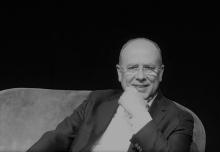
Welcome to Ideas for Democracy
A space for reflection and collaboration, created as a digital meeting point for professionals from the electoral world
Today we present Ideas for Democracy, from Minsait (an Indra Company), with the intention of establishing a community for ideation, reflection and collaboration, where electoral processes can be analysed from a technical and technological perspective. This platform is a space for the study of digital transformation and the impacts of trends, obstacles and new electoral challenges on governments and electoral authorities, in the Age of Digital Technology. Welcome.
It is never been as exciting as it is now to talk about freedom. I am referring to freedom in its meaning of free will (or freedom of choice). In other words, freedom as the belief that people have the power to choose and make their own decisions.
This is exciting, because the citizen of today has lived, in the last twenty years, a remarkable number of changes in the fundamental aspects of its organized reality. These structural changes –origin or result of crises and evolution–, have modified society in a way never before witnessed. Changes had never affected so profoundly, such a large number of people, so rapid and intensely.
These changes in recent history, have not only modified the form of society, but have also substantially modified the ideas and behaviour of citizens. The citizens themselves have changed, evolving into a new concept of citizen.
At the same time, as a result and driver for these changes, new tools for social interaction have appeared. Digital evolution provides new work tools for the benefit of society. Like any other human tool, they can also be used to diminish individual freedoms. Google and social networks, which are presented as spaces of freedom, have become a great panoptic […] where the watchmen can observe all the prisoners secretly. […] The inhabitant of the digital panoptic is both victim and actor. [1]
Digital tools offer elements, which enable the exercise of freedom, but, at the same time, they can turn the citizen into a model: measurable, predictable and even more manageable by means of the information and disinformation formula.
The changes in citizens' behaviour have led to an evolution in the tools for study and social interaction, which offer us surprising results and new ways of understanding and listening to what is really happening in society. In this new social and technological framework, freedom and free choice are subjects of current reflection, of continuous debate. With this, democracy is not only conformed as a system or form of government, but as a process where the individual chooses. A place where citizens exercise the power of choice and making their own decisions.
Through the electoral process, citizens perform the act of voting as an exercise of that freedom. It has become a process that requires adjustment to the new-citizens’ profile and to the new digital tools, with which they interact on a daily basis. This necessary adaptation drives and protects the freedom of choice of the individual. Governments, entities and electoral actors have the mission to guarantee that freedom.
These guarantees should also be transferred to the rest of the elements and cases studies surrounding participative processes, such as: voter registration and identification, electoral process methodology and systems, the protection of the process, actors and data and citizen participation itself. New technologies allow us to revolutionize the way things are done and are constituted as doors open to future, who’s characteristics, however, have yet to be defined.
It is with this intention that Ideas for Democracy was born: a forum for innovation, research and divergent thinking, which seeks to delve into the new electoral challenges faced by governments and authorities in the Age of Digital Technology and to discover the ideas that lead to the imporvement of democracy.
[1] Byung-Chul Han. “The Transparency Society”. (2013). In reference to Jeremy Bentham's panoptic










Add comment